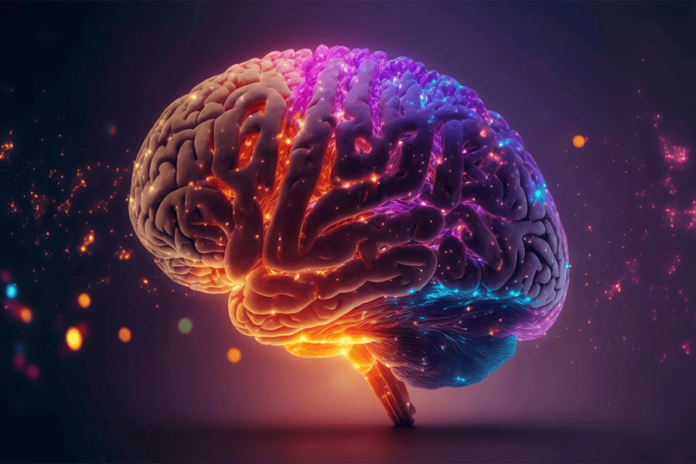According to a new study, taking a mid-day walk or doing household chores could enhance cognitive processing speed, making it comparable to being four years younger.
Exercise is known to enhance brain health and lower the long-term risk of cognitive decline and dementia. However, a recent study by researchers at Penn State College of Medicine reveals that even everyday physical activity can deliver immediate benefits for brain health.
The team found that middle-aged people who participated in everyday movement showed improvement in cognitive processing speed equivalent to being four years younger, regardless of whether the activity was lower intensity, like walking the dog or doing household chores, or higher intensity, like jogging.
The findings were published in the journal Annals of Behavioral Medicine.
“You don’t have to go to the gym to experience all the potential benefits of physical activity,” said Jonathan Hakun, assistant professor of neurology and psychology at Penn State and the Penn State College of Medicine. “All movement is important. Everyday movement counts as a source of accumulated physical activity that could be credited toward a healthy lifestyle and may have some direct impact on cognitive health.”
Previous research that has examined the relationship between physical activity and cognitive health typically looked at the long-term relationship, for example, over the course of decades for a retrospective study or months to a year for intervention studies. Hakun said that he was interested in connecting the dots sooner to understand the potential short-term impact of physical activity on cognitive health.
Innovative Research Approach
The research team leveraged smartphone technology to interact with participants multiple times during their regular daily lives using a protocol called ecological momentary assessment. Over the course of nine days, participants checked in six times a day, approximately every 3.5 hours.
During each check-in, participants reported if they had been physically active since their last check-in. If they were active, they were asked to rate the intensity of their activity — light, moderate or vigorous. For example, walking and cleaning were considered light intensity while running, fast biking, and effortful hiking were considered vigorous intensity. Participants were then prompted to play two “brain games,” one designed to assess cognitive processing speed and the other designed to assess working memory, which Hakun said can be a proxy for executive function.
The team analyzed data from 204 participants who were recruited for the Multicultural Healthy Diet Study to Reduce Cognitive Decline & Alzheimer’s Risk. Data was collected during the study’s baseline period. Participants were between the ages of 40 and 65 and residents of the Bronx, NY who had no history of cognitive impairment. Half of the participants were Black or African American and 34% were Hispanic.
Key Findings: Boosting Cognitive Processing Speed
The team found that when participants reported being physically active sometime in the previous 3.5 hours, they showed improvements in processing speed equivalent to being four years younger. While there were no observed improvements in working memory, the response time during the working memory task mirrored the improvements observed for processing speed.
“We get slower as we age, both physically and cognitively. The idea here is that we can momentarily counteract that through movement. It’s compelling,” Hakun said. “There’s the potential for a brief walk or a little extra movement to give you a boost.”
Additionally, people who reported being active more often experienced greater short-term benefits compared to those who reported less physical activity overall. Hakun said that it suggests that cognitive health benefits may increase with regular physical activity. However, he explained that more research is needed to understand how much physical activity and the frequency and timing of being active influences cognitive health.
Hakun says that future research may include pairing the ecological momentary assessment with activity monitoring tools to better track the association between observed physical activity, behavior, and cognitive outcomes. He also hopes to collect data over a longer period to see how everyday physical activity influences cognitive health over time compared to normal aging.
Reference: “Cognitive Health Benefits of Everyday Physical Activity in a Diverse Sample of Middle-Aged Adults” by Jonathan G Hakun, Lizbeth Benson, Tian Qiu, Daniel B Elbich, Mindy Katz, Pamela A Shaw, Martin J Sliwinski and Yasmin Mossavar-Rahmani, 19 October 2024, Annals of Behavioral Medicine.
DOI: 10.1093/abm/kaae059
Other Penn State authors on the paper include Daniel Elbich, data scientist; and Tian Qiu, doctoral student in epidemiology and public health sciences; and Martin Sliwinski, professor of human development and family studies. Other authors include Lizbeth Benson, research assistant professor at University of Michigan’s Institute for Social Research; Mindy Katz, senior associate in the department of neurology, Albert Einstein College of Medicine; Pamela Shaw, senior biostatistics investigator, Kaiser Permanente Washington Health Research Institute; and Yasmin Mossavar-Rahmani, professor of epidemiology & population health, Albert Einstein College of Medicine.
Funding from the National Institute on Aging of the National Institutes of Health supported this work.
By Penn State from SciTechDaily

